I’ve written this article primarily with newer and future expats in mind, but many of our long-time Cuenca residents may find something here to inspire them as well. It’s my sincere desire to help get new expats off on the right foot, and then watch them grow and flourish as they discover all the new things they’re capable of – to become self-aware of just how much more talent, potential, passion, and compassion than they were ever aware of.

Moving to Ecuador doesn’t have to be just a place where people go to retire because they can’t afford to live in their passport countries anymore. Rather, it’s a place where it’s likely that nobody knows you. That means you’re even freer to become a brand-new you and reinvent yourself. You can now fulfill many of the hopes desires and goals you’ve been saving up over the decades while you were busy working, living, and raising a family.
Most of us have things that we always wanted to do, but, for some reason, just never got around to them. Or, they may have been things that you never even dreamed you ever would or could do! With that said, let me tell you my personal story, and then, someday, I hope you’ll tell me yours.
To me, I still feel like my own story borders on the improbable, if not the impossible. Even with a functioning crystal ball, I could never have seen or imagined myself doing many of the things I’ve done since arriving in Ecuador.
Mr. Anonymity
Back in the USA, I was virtually anonymous in every way. I had one close friend and maybe a dozen acquaintances with whom I was friendly. Then I had my children and grandchildren, but they had lives of their own, and it got increasingly hard for us all to get together. Even during my last assignment with the US Air Force, hardly anyone in my building knew who I was, apart from my boss and the people in my department. Other people who worked in my building used to stop me in the hallway and ask if they could help me find someone, and I would say, “No, that’s okay – I work here!” And when I’d tell them that I’d been there for several years, they’d just look at me sideways, as if I were a spy or something (another story for another time!)
Then, when you retire from the military, the tradition is to give you a US flag, folded up and put inside a nice wooden display case, with a little engraving with your name, rank, and some sort of inscription to indicate how folks regarded you. So to show you just how truly anonymous I’d become, here’s my retirement flag, with the engraved plate blown up for ease of reading.
My name, rank, and then… “WHO?” Everyone got a good laugh out of it (including me). Besides, it couldn’t have been more accurate!
My military mission was finally complete, and I would now boldly march off into civilian life with the same anonymity that I’d known in the Air Force. Or so I thought.

By now, you may be wondering, “Why did this guy choose to hide out so much? Why did he apparently have so few friends?” The simple answer is that I’m an off-the-charts introvert. My particular personality type is often referred to as the “extroverted introvert,” which means that we can “fake it” as extroverts for short periods of time, but the underlying introversion is always there, trying to drag us back into the safety and comfort of relative solitude of our personal “hamster balls.” We don’t dislike being around other people, but we tend to be very selective about whom we spend time with, and we tend to keep our circle of close friends small and manageable. Some people equate introversion with “shyness,” but that’s not the case at all. The bottom line is, that your personality type will ultimately shape many of your choices, but it does not have to hold you hostage, nor should it prevent you from being whomever you’d like to be, or doing whatever you’d like to do.
Back before I retired from the military, my life revolved around work, university classes, family, a little bit of TV, and then “rinse and repeat.” After my military retirement, I became interested in hand drumming after watching a movie called “The Visitor,” and I started going to local drum circles. Still, that was about the extent of my socializing. In short, I had no real life in the United States, so I filled up the hours with empty stuff like eating too much junk food and watching excess television (although I do miss American Pickers, Pawn Stars, and miniature Reese’s Cups).
The Transition & Transformation Begins
February 1st, 2024 was my tenth anniversary of moving to Ecuador. Life back in the USA was already getting crazy-expensive, even way back then. Additionally, I was having trouble getting a job because I’d been in a bad, head-on car crash and had been unable to work for about 3.5 years. In fact, it was my inability to find work in those first few years after my accident that led me to come and visit Ecuador in the first place. Almost exactly two months later, I returned to Ecuador and was living in Cuenca.
I soon discovered that there was something personally liberating about moving to a new country where nobody knew me. If I’d wanted to, I could have taken on a new name (I know lots of people here who have!). But in my case, I didn’t have to; my mother-in-law took care of that, and affectionately refers to me as “Jeffcito.” Or, I could have taken on various new hobbies, gotten involved in local charities, or done any number of the things that other expats do here. It took me a few months to get settled before branching out too far, but I had successfully escaped my old life and was ready to start anew.

From what I’ve witnessed personally – and from what I’ve seen from so many others here – is that retirement is not the end phase of our lives. Rather, it’s just the beginning! Retirement is where we go to blossom and become all the things we ever wanted to be. And while I don’t begrudge anyone getting a fully loaded Fire Stick and binge-watching the latest series, there’s so much more that you could be doing here, assuming you’re relatively healthy and have a sense of adventure. Of course, we’re all different, and the things we choose to do in our respective “sunset” years will vary greatly. Some become writers. Some become actors. Others turn to charity work, including working with orphans, helping victims of abuse, feeding the hungry, etc. The options are limited only by your imagination.
So for me, since I’ve been here, I’ve delved into things that were totally new or foreign to me. I didn’t arrive here with the mindset to “branch out,” but fortunately for me, I hate to be bored. After a few weeks of walking around my apartment and talking to myself entirely too much, I decided that I needed to get a little busier. The result is that I have largely re-invented who I am, what I value, who my friends are, etc. My life is infinitely richer here than ever before, but that didn’t happen by accident, nor did it happen overnight. Rather, it happened in part as a result of one thing that I sincerely enjoy: helping others. So here are some of the things I’ve either done or am doing since moving here, some in which I experienced greater degrees of success than others.
Started a Drum Circle

This really challenged my introverted sensibilities, but the first thing I did in Cuenca was start my own drum circle, only three weeks after arriving in Cuenca. I brought these three djembes with me from Colorado, put an ad online, and then hosted my very first circle. And although I’d participated in numerous drum circles in the past, I’d never led one before. But since I was the only one who knew how to play a drum at that first circle, I fell into being the “leader” by default. This exposed me to tons of people over the course of my 10 years here, and some of them have or have become good friends. A few of them have since moved on or lost interest. Likewise, I also stopped hosting my own circles due to spotty attendance, but idiomART has picked up the slack, and they now have drum circles every month or two. I still, however, provide a lot of assistance to the drumming community, by repairing certain types of drums, putting new skins on for the drumhead, and making a number of my own drums.
Learned to make Bonsai Trees
A friend who was moving back to the US gave me her books and a few tools used for creating bonsai trees. This really caught my interest, and over the next several years I would create dozens of bonsai trees. For those who don’t know, a bonsai is supposed to resemble a larger, more-sculpted tree, but in miniature. It takes a lot of work just to get them into the pot, and then you have to be very scrupulous in maintaining them. But I still found it very personally rewarding, and to my surprise, delightfully therapeutic.

The first challenge was to find a plant with the right “bones” to form a bonsai. Then, once you have the plant, just preparing it for the pot is a labor-intensive job. It involves pulling the plant out of its original container, cutting off all the thick roots, and trimming the small feeder roots so that everything will fit neatly into a tiny bonsai pot. This process results in a plant that can be very finicky, because once they get accustomed to a certain place, a certain amount of water and light, etc, they tend to react poorly if any of those conditions are changed – such as when you have to move! As a result, more of the bonsai trees I’ve created have died than are still alive. But as I kept moving on to doing other things, I finally reached a point where I felt like I’d done my last bonsai, so I sold my tools and books and prepared for the next chapter. Nevertheless, I consider what I’d achieved with the bonsais to be both important and life-changing, and has definitely made me appreciate the way city workers keep Cuenca’s trees so beautifully trimmed and shaped.
The End of My Anonymity – Started a Facebook Group
Back when I first got here in 2014, there were just a couple of general expat groups on Facebook. Some were good, and some were ruled by iron-fisted admins who would toss people out at the drop of a hat. This was disconcerting because anyone who wants to keep track of what’s going on in Cuenca (and other parts of Ecuador) truly needs Facebook as one of their resources for discovering local activities and events. Other groups were managed by admins with clear ulterior motives, most of which were designed to separate expats from their money.
As a result, I felt the need to create a group that was more inclusive, had fewer ads, excluded hidden agendas, and served as a reliable source of information for local expats. I also decided from the start that it should be a more tolerant group and that I wouldn’t throw people out simply for disagreeing with me on some minor issue. The result was a new group called Expats Without Agendas – Ecuador. The group currently has over 3,400 members, and I’ve received a lot of positive feedback on the way the page is managed. Many expats have told me that it’s one of their favorite groups, largely because it’s well-moderated, and it’s kept free of snarky comments, arguments, and mean people.
I also created a handful of “sister pages,” all serving different groups of people with different needs and interests: These included a music-appreciation group, a TV/Movie-appreciation group, a Spanish-learning group, and several others. One of my driving motivations to create these groups was my sincere desire to be helpful to others. But, as a direct result of having all these pages, I inadvertently became much less anonymous than I had ever intended! But I’ve also made a lot of great friends in these groups, and I’d like to think that the groups have been helpful to those who use them. It’s also led me off in dozens of other directions, and has enriched my life tremendously. It can be a bit of a burden to manage them all, but I’m lucky to have good folks serving as additional admins or moderators.
Became a (better) Amateur Photographer

I’ve always been interested in photography, but coming to such a beautiful place as Ecuador really turned that “interest” into a full-on passion. As a result, I have since picked up a new camera and have been gradually trying to make my finished photos more artistic and well-composed.
It’s still a work in progress, but it’s definitely an ongoing addiction that I’ll have for as long as I can carry a camera. I refer to myself in the header as an “amateur,” but I did recently sell ten of my photos to a gentleman who plans on using them as part of a coffee-table book of photos that show the beauty of Ecuador. In any case, as many other expats have found out, great photography subjects are everywhere you look in Ecuador. It’s a fun and satisfying hobby (or business!) within the reach of most of us, even if you only have a good cell phone camera, many of which can take some amazing shots!
Making & Fixing Stuff!
As most of you know, Amazon doesn’t deliver directly to Ecuador, and there are many common items in North America that simply aren’t available here, or it just isn’t practical to carry them down here with you. So what do you do? You can either pay someone to make an item for you, or you can make it yourself! I was always a bit on the “handy” side, and my years in the Air Force had already taught me how to “MacGyver” many items needing repairing when “official” parts or hardware weren’t available. But for my own purposes, all I’d ever done before was some very rudimentary woodworking, like making some rough shelves, or a platform bed for the back of my old Dodge van. Fortunately for me, some of the things I brought down here with me were some inexpensive power tools, like a battery-operated circular saw, a cordless drill, a Dremel, and a jigsaw. Another thing I always do when I go back to the U.S. is to visit that part of Home Depot where all the small, gray, metal drawers contain all manner of unique hardware. I’ve brought back things like tap-on nuts, wingnuts, boxes of assorted metal washers, rubber feet to screw onto the bottom of something, and a number of other bits and pieces that you simply can’t find in the Cuenca area.
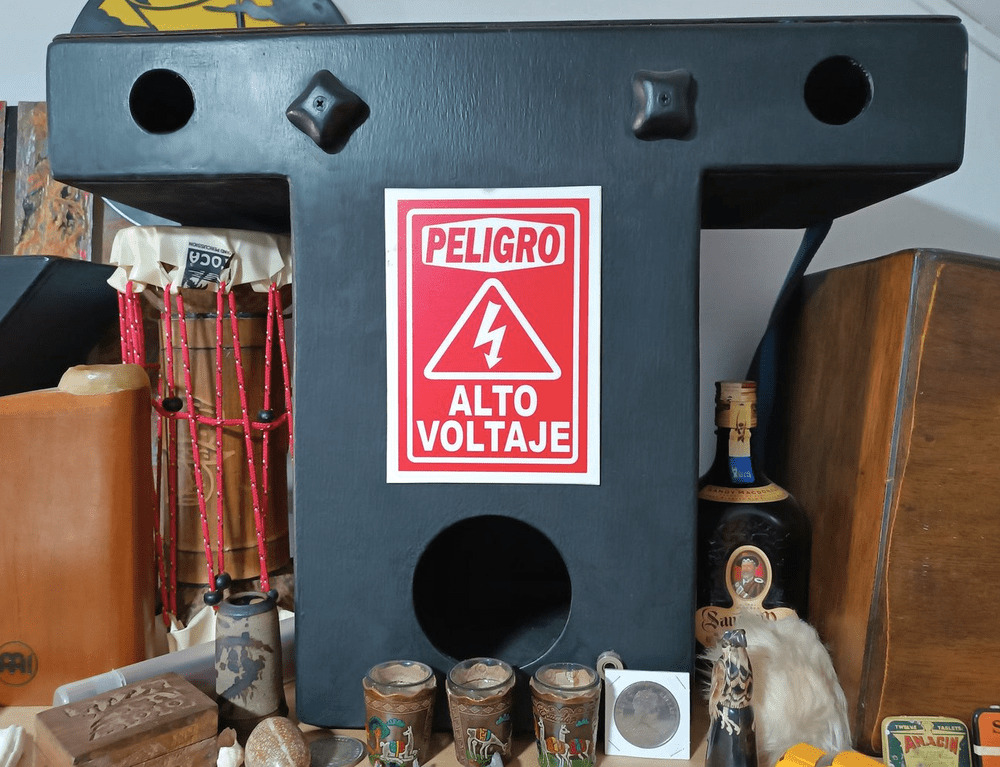
I mentioned my love of drumming above, and one day I decided that I really needed a cajón, which is a simple wooden drum box. I had bought a used one initially and then sold it later when I was in a financially tight spot. Later on, when I decided I needed another one, I found that most of the new ones here were ridiculously expensive. I mean, how much should one charge for a mostly empty wooden box with a few snares inside? The prices I was seeing were $300 or more, so I thought I’d try my hand at making one myself. The first one I built wasn’t so great, but it taught me a lot. I’ve since built about ten different sizes and shapes of cajóns, one of which was commissioned by another expat. The most I ever paid for materials for a given cajón was around $30, and most were much less than that.
The one in the photo is patterned after a model sold in the US as a “Slap-Top” cajón – it straddles your lap and allows you to play the top surface, rather than sitting on top of the cajón and bending over to play it. This one has adjustable snares to get just the right sound, plus an internal pick-up microphone that allows me to plug it into an amplifier.
The other models I built were all for different types of drumming scenarios or sounds. I should state that I never used any plans (except for my own), nor did I know exactly what was inside the commercial versions of the cajóns that I was building; it was pure trial and error on my part, which was part of the fun.
And because of the relative unavailability here of what we’d call “common hardware” I’ve had to do a lot of MacGyver-ing to make or repair any number of personal items. Whether it was to put new wheels on a shopping trolley, to put a new fan in an air fryer, or to repair a microphone stand – I’ve learned not to throw away anything of potential future value. If something does have to go in the trash, I make sure to strip it of any useful parts or hardware that I might be able to use for some future project or repair. I should mention that, besides the cajóns, I’ve made other types of drums, a couple of nice workbenches, a sit-or-stand adjustable computer desk, some innovative storage solutions, a handful of doggie doors, and a lot of other things that I would have never even considered making in the US.
Learned to Speak Another Language
Okay, I’m not 100 percent fluent, but my Spanish is good enough to communicate with most native speakers over a wide range of topics. I took Spanish classes a few times in the US, but never really learned much except for a handful of key phrases and some pronunciation rules. My first real attempt at learning Spanish in Ecuador involved listening to Spanish-language music, and then looking up the lyrics online and doing my best to translate them. Then I’d learn the lyrics and sing along with the song in the car or shower. Later, I started doing what amounted to “journal entries” that would relate to some recent experience, and then I’d put them in my group, Español para Extranjeros (Ecuador), for both native speakers and local experts to critique. I then ended up taking some classes locally, but I ultimately found it easier to learn on my own.
Married into an Ecuadorian Family
I arrived in Ecuador as a confirmed bachelor… but sometimes things change! I met my future wife, Annie, when my former massage therapist was out of town. I looked online for another therapist, and that’s how I met Annie.

Granted, getting married to a foreign national doesn’t necessarily mean that you’ve reinvented yourself, but in my case, marrying an Ecuadorian woman with three daughters presented a lot of changes and challenges, both personal and cultural. Within a very short period of time, I would meet most of my new extended family and, to my surprise, was graciously accepted by them as one of the family.
I also attended new types of social activities, high-school graduations, birthday parties, holiday celebrations, and a whole lot more! (They love to celebrate here!) You could say I’ve experienced baptism by fire into real Ecuadorian culture. Now, about seven years later, I have one daughter about to graduate from business school, another one who just finished the classroom phase of medical school and will start interning soon, and yet another in high school who wants to follow her sister into medicine. It’s been a wild ride, but in this case, they reinvented me! I won’t lie: living in an Ecuadorian family will sometimes (and forcefully so) drag a hardcore introvert out of his shell and put him in a lot of situations that are less than comfortable. But at the same time, I think it’s taught me to be a lot more calm and accepting of new types of social activities. And not to leave out the obvious, but all we speak at home 98 percent of the time is Spanish, so becoming a member of this family has really helped my own Spanish considerably.
Gave Tours to New Expats

I’d arrived here in the country as a single man, making just enough money to support myself. Suddenly, after taking on a new family, I needed to find an additional source of income. I had a van, and I had also moved enough times that I knew quite a bit about the different neighborhoods here. Likewise, I’ve been inside hundreds of homes in Cuenca, and I have learned how to spot dozens of problem issues related to things like noise sources, poor security, higher-than-average prices, and a number of other helpful facts about Cuenca and the rental market here. In fact, I wrote a three-part article about finding a home in Cuenca.
So I started offering tours, mostly to new expats, or for those people visiting Cuenca on scouting trips. I gave them a good lay of the land, provided custom maps, explained the pluses and minuses of the different parts of town, supplied house-hunting tips in the form of detailed handouts, and then wrapped up the tour in Turi, where we could look out over the city. From there, I could tie all the landmarks together for them and help them see the “big picture.” I also offered other services, such as taking people on day trips, doing shopping for folks who couldn’t get out, moving small loads, and other services that required having a vehicle.
I rather enjoyed my time providing these services, plus I met some truly wonderful people who would later end up becoming good friends of mine. One thing that many of them kept telling me was: Since you know so much about the rental process here in Cuenca, why aren’t you working as a rental agent? My answer was always: “Oh, I could never rent a house to someone that I wouldn’t be willing to live in myself.”
I Became a Rental Agent

So after answering the above a hundred times (about why I didn’t want to rent houses), I suddenly realized that I didn’t have to list or show houses that I wouldn’t live in myself! In cases where another agent was showing a client of mine a given property, I would quietly point out all the problems I saw, if any, and did my best to make sure that nobody ended up in a home that they might come to hate. Once again, I met a lot of great people and made a bunch of new friends by being an honest rental agent. I also met a handful of other good agents, including my two associates from Venezuela and Colombia. It was an unlikely collaboration, but it did wonders for my ability to understand Venezuelan Spanish!
As a related service, I started doing unofficial pre-move-in inspections for expats who wanted another set of eyes on the property before they made a final decision. I had no formal training in doing inspections, and I was very up-front about that. Still, I’d seen enough of the different problem issues that one might run into in the Cuenca housing market, and I did indeed feel qualified to point out roughly 90 percent of the positives or negatives regarding a given property.

Then, as a natural add-on to doing rentals, I also started reviewing and editing rental leases, putting in important protective language, and removing predatory language placed there by unscrupulous agents and homeowners. And I’m not exaggerating when I say that I’ve saved several expats from dire housing situations, but I’d also be less-than-honest if I said I didn’t make a few rental recommendations that I later regretted. The thing is, without a crystal ball or X-ray vision, there are always going to be a few things that slip you by during any inspection.
I Had a Gastric Bypass
Back when I arrived in Ecuador, I had both type II diabetes and hypertension. The diabetes, in particular, gradually got worse, and at times got completely out of control. My wife, having been a nurse at IESS for a long time, spoke to a bariatric surgeon there about getting me on the gastric bypass list. After having a multitude of physical exams and interviews with a psychologist, I was put on the program and had to lose a percentage of my weight before they operated on me. So about a year later, we finally got the surgery done… and then a student nurse at IESS leaned across my bed and put his hand down (with all his weight) on my brand-new surgery site. This, as we later found out, caused some of the surgical staples to buckle, and I started leaking inside. This resulted in my developing peritonitis, and needing emergency surgery to save my life. I spent eight days in Monte Sinai with a feeding tube in my neck, which was not what I call a “good time.”

But I got better, lost about 90 pounds, and put both the diabetes and hypertension into remission. (I also never had to ask for a seat belt extender on those flights back to the US) And speaking of which, I did have to go back to the US and buy a whole new wardrobe. I had gone from a 3XL t-shirt and 43-inch trousers to a size L shirt and 33-inch pants. Nothing I had even remotely fit me anymore, except for my shoes, and even they were a bit looser than they used to be. It’s not been over 4.5 years, and I’m still within a couple of pounds of my lowest post-surgery weight. You can see the “before and after” in the photo above.
I Became… a Musician?
This is a very unlikely story that began a very short time after arriving in Cuenca. Keep in mind that a traumatic experience with a nasty 8th-grade music teacher had pretty much ended any interest or possibility of me ever performing publicly. In fact, It wasn’t until I was nearly 60 years old that I ever knowingly sang in front of other people. Now, I’m almost 67, and I still get a little nervous about live performances, but I’ve gotten a lot of encouragement that’s driven me to get deeper and deeper into the process.
Now, besides the drums I’d brought with me, I’d also purchased some bongos and a set of congas here in Cuenca. Just out of pure dumb luck, I saw an ad somewhere that said a local Ecuadorian band needed someone to play percussion. Well, I had all the drums, so I wrote them a message. Before I knew it, I was going out to Sayusí every week or so to practice with them. They did a lot of well-known Spanish-language pop and rock tunes, and it was a lot of fun to play with them. But they had a problem, in that they couldn’t manage to keep a lead vocalist! One singer’s mother was afraid that being in a band would lead her son to become a drug addict, while the wife of another vocalist was afraid he’d be smothered in groupies! So the group folded, but as the sole gringo in the group, it was a very interesting learning and cultural experience for me. Likewise, I made some of my very first Ecuadorian friends here, and we still enjoy bumping into each other on occasion.
Several years later, I was asked to provide percussion for a new gringo band that was just getting started. We were trying out a bunch of different songs, but there were a few where the lead singer just couldn’t hit the higher notes on one particular song. So I’d been sitting there, humming along to the melody of that song, and all of a sudden I was asked to try singing the song myself! I can’t adequately describe the initial sense of horror that I felt, but then I felt something inside of me start to give way. So I said, “Sure, I’ll give it a shot.” This was the first time I’d ever sung in front of other people, but they seemed to think I had a decent voice, and they started giving me other songs to do. But as the practices went on (and we got dangerously close to doing a live performance, I completely freaked out and backed out of the band before it ever got the chance to play in front of others.

I’d always regretted quitting that first expat band, but later on, one of the same people who’d been in that band approached me, asking me to do some music with his new band – primarily on vocals and percussion. So I ended up joining my first group, The Kokopelli Moonlighters, which eventually led to my very first public performance. To say I was scared stiff would have been an understatement, but then something funny happened – I realized that I was enjoying myself! One live performance led to another, and then to many more over the following months.
Then yet another person from that first expat group messaged me and asked if I’d be interested in doing some music with him. However, our respective vocal ranges were pretty close together, so any attempt at harmonizing with each other was tough. As a result, we recruited a wonderful female vocalist and set about putting together a list of songs that all focused heavily on multi-part harmonies. We were then joined by the best bassist in Cuenca, and that was the beginning of the band I’m currently a part of, Northern Roots. I was actually in both bands at the same time, but that grew difficult, so I ended up having to resign from the first band and stay with Northern Roots.
Both bands combined, we’re talking about an approximate five-year journey. During that time, my fellow bandmates got tighter and tighter on those harmonies, and we found that we typically sold out wherever we played. We even did a live-streaming concert during the COVID lockdown, and several other live-streams from various other shows, allowing our friends and families scattered around the world to listen to us play. And I have to say that, because of my love of music, these years of playing together with both bands (and various other random Cuenca musicians) have been one of the greatest highlights of my life. Eventually, my voice will fade away, but for now, I can’t think of anything that I’d rather be doing.
I Started Learning to play Other Instruments
The COVID lockdown was a long and excruciating experience for all of us and a tragic experience for millions of others. But there I was, trapped in my house most of the time when a fellow member of The Kokopelli Moonlighters lost her cell phone and needed another. I just happened to have an older-but-functional phone, which I traded to her for an older-but-functional classical guitar. I then started learning some chords, playing along with YouTube videos, and enjoying the heck out of the process. But the classical guitar just wasn’t what I wanted to be playing, so I eventually bought a brand new acoustic guitar and started learning to play that one. I even signed up for online lessons, but I’ve been tragically lazy about utilizing them. As a result, I’m currently stuck at a rough intermediate stage, but I still have fun. (And I will be getting into those online lessons soon!)

Along with the guitar, I purchased an assortment of different-keyed harmonicas and started brushing up on those skills. Again, I’m far from “good” on the harmonica, but I do play at many of our live shows. Then I was looking at Facebook Marketplace one day and found a brand-new mandolin at an incredibly low price, and bought that as well. A year or so later (about a month ago), I picked up a concert-sized ukulele and started learning how to play that. So now I’m partially proficient (that’s another way to say “I suck”) on all three stringed instruments. But I’m determined to master at least one of them if not all. I still have a long way to go, but learning new instruments (like singing at live concerts) has changed the course of my life. Practicing guitar every day has become a passion of mine, and I also try to squeeze in a little mandolin or ukulele each day as well.
So while I was here in Ecuador, joining bands, learning instruments, and so on, I kind of forgot that my family back in the US had a very limited idea of what I was doing here. One time, I posted a video on my Facebook page where I was with a couple of friends in Vilcabamba, playing bluegrass tunes together outside in the evening. After seeing the video, my sister texted me and asked “What were you doing with that guitar in your hands?” Playing it, I told her! (She was as surprised as I was!)
So Did I Actually Reinvent Myself?

From my own personal perspective, I have absolutely reinvented myself from the person I was 10-plus years ago. I went from being an extremely introverted and emotionally/physically damaged person to being someone that a great many Cuenca expats on the street recognize, and even call out to me by name. Unfortunately, my personal encounters with them had only been very brief or had only been online. So while many Cuenca expats know me on sight, I’m embarrassed to say that I’m often not sure who’s out there saying hello! I usually know them by name after they introduce themselves, but my presence online and in the local expat music scene has made me far less anonymous than I’d ever been in my life!
I won’t say that life in Ecuador has always been fun or easy; I’ve had a number of personal and health-related challenges that are obviously some form of karmic payback for being a real “SOB” in some previous life! Just in the past year and a half, I’ve had COVID-19 twice, developed “long covid,” got dengue fever, had pneumonia, tore a hamstring, and just had prostate surgery a week ago! All I can say is that it’s a good thing I’m an optimist, and I continue to look for new things to tackle, new things to learn, and more and more ways to reinvent myself.
To recap, I went from having a life based on work and school and family (and little else) to being someone who has branched out and embraced various new hobbies, taken on various musical endeavors, and tried to continue to help folks become more successful expats via my Expats Without Agendas Facebook group. I have a loving and beautiful Ecuadorian family who takes better care of me than I do of myself, and I have a much more satisfying existence than I probably deserve. Before Ecuador, almost nobody knew who I was. Now, a great many Cuenca expats (and many Ecuadorians) have at least learned my name, and it’s quite likely that we’ve shared some personal experience where we helped each other out with something, such as rewording a rental lease, playing some music together, or helping someone find a new home.
I’m still an off-the-charts introvert, so I continue to covet my precious private time, which is essential to recharging my internal batteries. But coming to Ecuador has honestly changed my life, and nearly completely! I dare say that moving here has probably saved my life as well, especially had I remained in my old, stagnant, routine-laden life in the U.S. If all that isn’t reinventing oneself, I don’t know what is!
In Conclusion
I’m still dumbfounded as to how I got here, and how (and why) my life has undergone so many unforeseeable and exciting changes. But my real reason for writing this wasn’t just to tell my story, but rather to encourage those of you who are stuck in a rut to get out there and do stuff! Learn stuff! Be someone else! Or add an “-ito” or “-ita” to your name and go completely native! I never, for a moment, foresaw the person I’d be ten years after leaving Denver and arriving in Quito. Life is unpredictable, but you have the power to choose how certain things will unfold for yourself. As such, I strongly encourage you to forget that you’re “technically” retired, and get out there and reinvent yourself. I mean, if someone like me can do it, then you can absolutely do it, too!






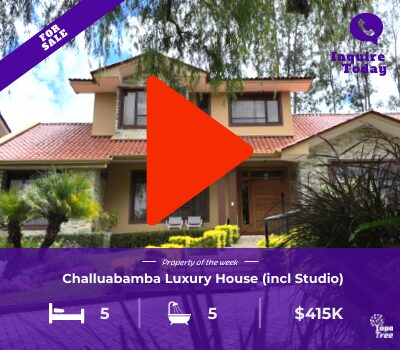





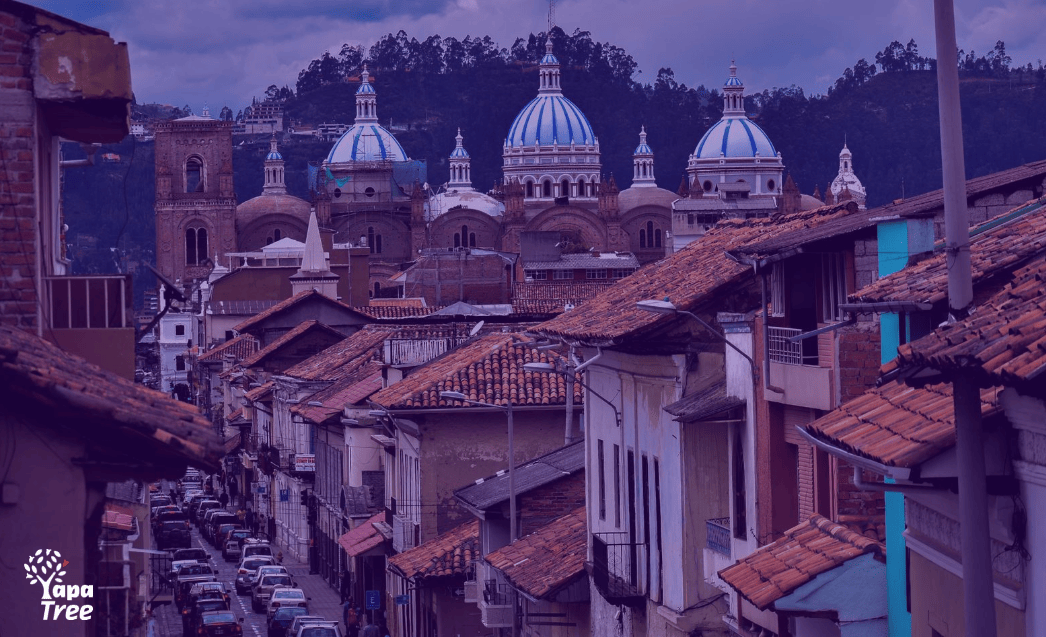
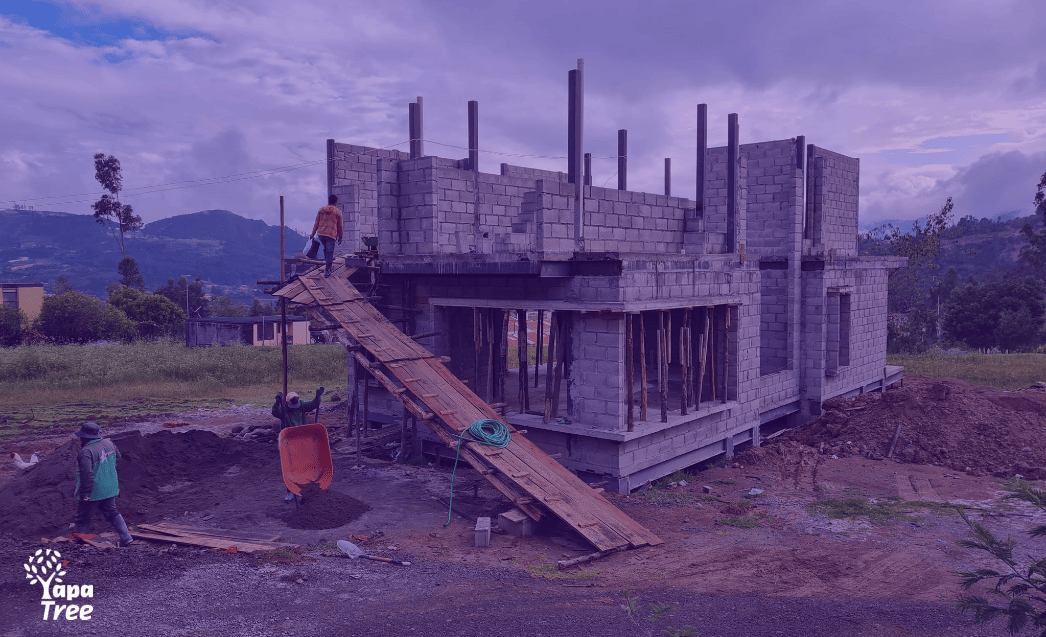
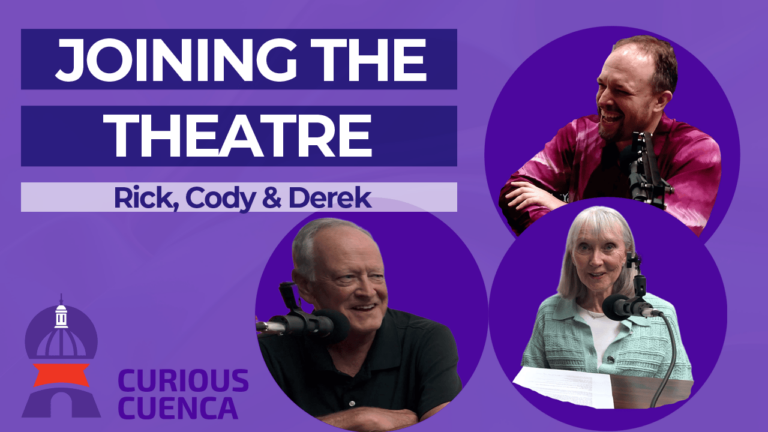
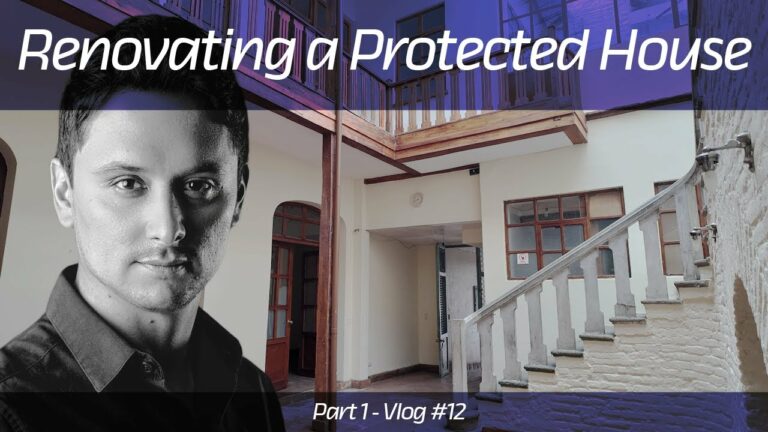
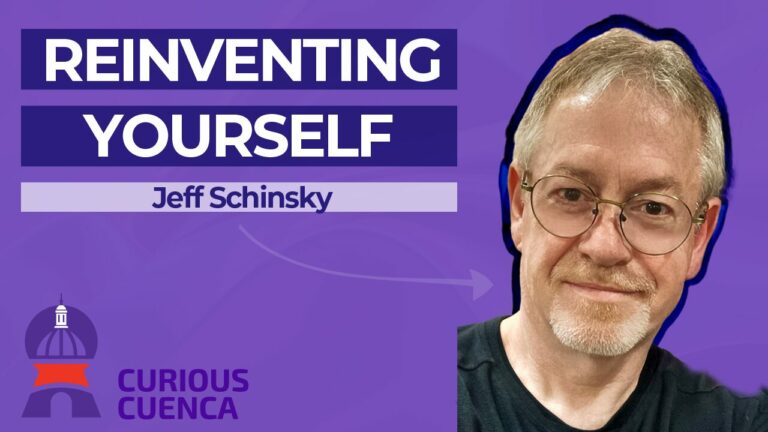
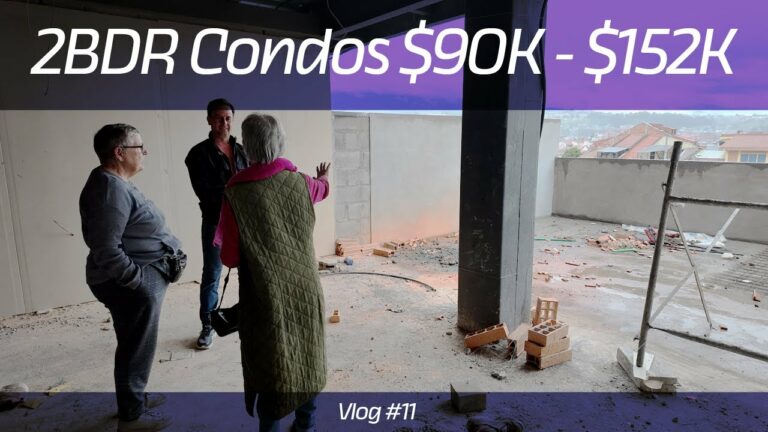
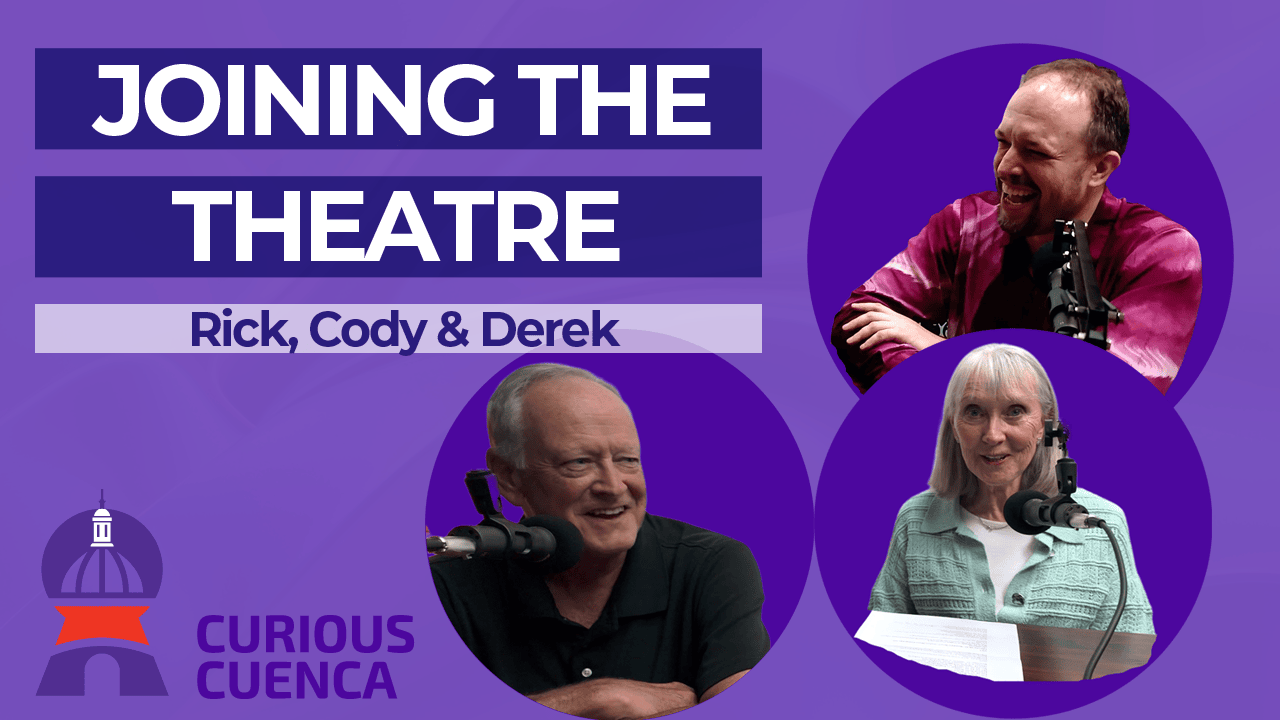
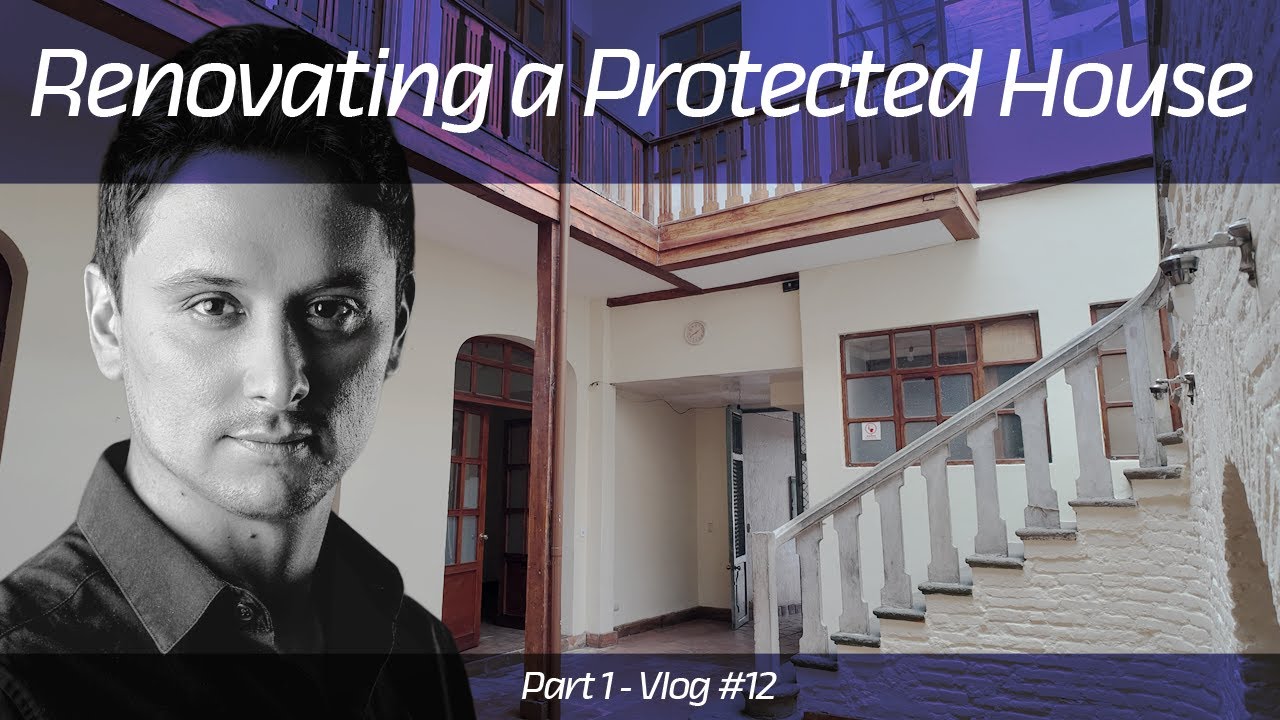
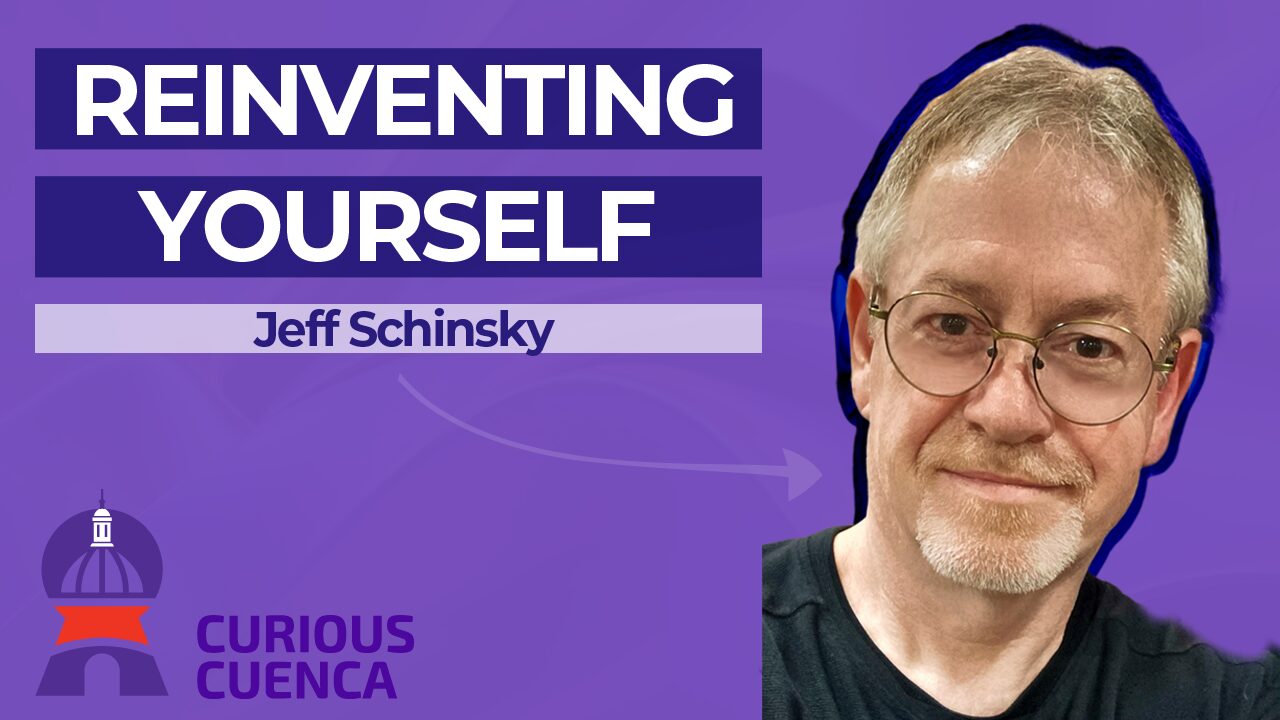
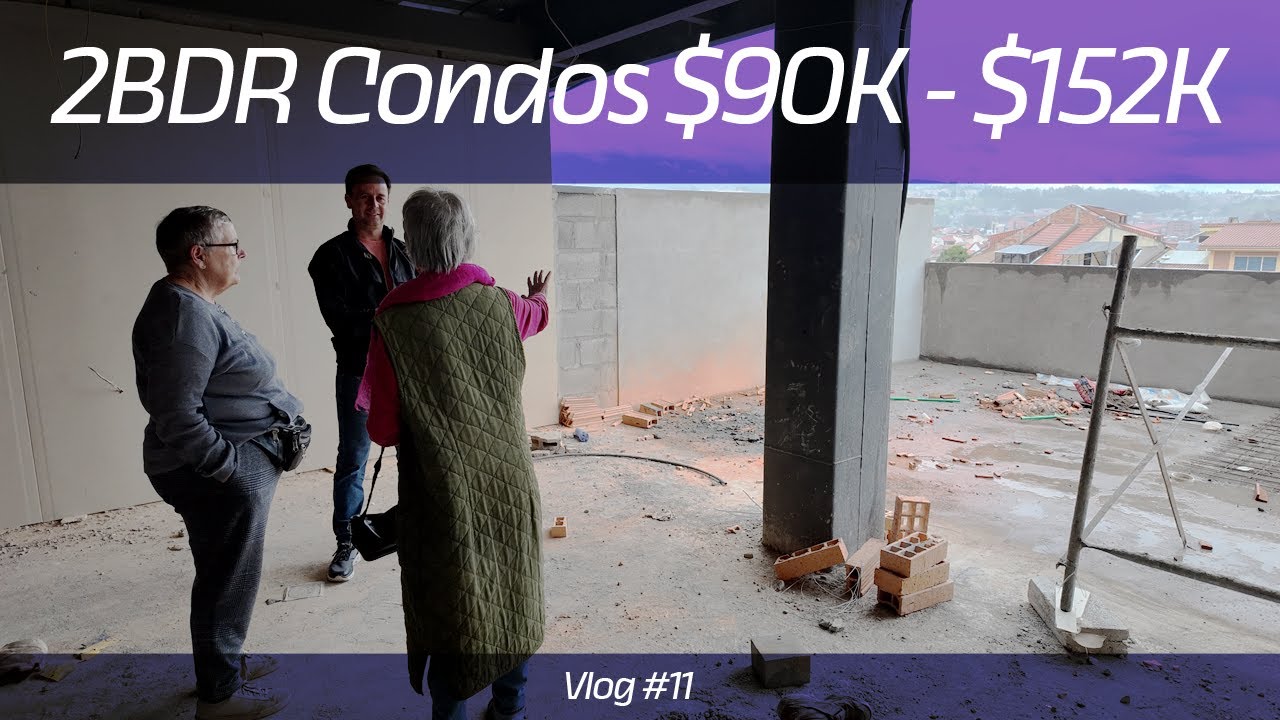
4 Responses
Really great story Jeff!
I’m happy to say I consider Jeff an online friend… whom I haven’t had the pleasure of meeting “in the flesh” yet. I hope we get to do that this summer.
Rock on Jeff, that is an amazing amount of things to happen to you in ten years!
Thanks, Gregg! I wish I could say that I did all of them well or with astounding success, but I can assure you that it hasn’t been boring!
Well you definitely make me feel like a loser, Jeff, with everything you do (just kidding!) but I really loved this article. I just moved to Cuenca six months ago and I doubt I will catch up with you but I am definitely reinventing myself little by little and contributing to the community in different ways.
I am also an “extroverted introvert” and it’s kinda complicated, right? But it’s really a wonderful place for people like us because we can experience all the social events we want but also retreat easily to recharge.
Anyway, you have given me motivation and thanks for sharing your story. It is a time of transition and time gets far more precious, so we may as well enjoy it.
Thanks, Ellen!
INFJ?
In any case, when I think back to when I’d only been here six months, I was still just trying to figure out how to fit in, learning a little Spanish, figuring out how to order a tank of gas, etc. etc. Other than my drum circle, I didn’t start branching out to other stuff until after I’d been here for a year or so. But if you want to reinvent your life, then this is definitely the place to do it!
Bienvenida a Ecuador!
JS